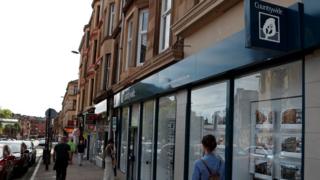Estate agent Countrywide sees Brexit uncertainty hit trade
 Image copyright
Image copyright
Reuters
The UK’s largest estate agent group, Countrywide, has reported widening losses and says the uncertainty surrounding Brexit is hitting business.
Losses last year were £218m, compared with a £207m deficit in 2017.
It said Brexit uncertainties were “affecting both our sector and consumer confidence as a whole”, and earnings would be hit this year.
Separately, a survey from the Halifax said house prices rose 5.9% in February from January.
‘Stronger position’
Countrywide trades under a variety of estate agent brands, including Bairstow Eves, Bridgfords, Hamptons, John D Wood and Mann.
The company, which had already warned on profits during 2018, said it had faced market weakness in the fourth quarter of the year.
Countrywide’s chairman, Peter Long, said that the slowdown would continue in the first half and reduce earnings by £3m to £5m.
“2018 was undoubtedly one of the most challenging years that the group has faced,” Mr Long said.
“As a group we are in a stronger position than we have been for some considerable time with sound business fundamentals and, despite the difficult market conditions we are facing, we remain confident in delivering our turnaround.”
Mr Long took over as executive chairman at the start of 2018 when the chief executive Alison Platt left after a profits warning. In August, the business raised £140m in an emergency fundraising from shareholders.
The shares – which were around 100p a year ago – were down more than 15% on Thursday morning, below 9p.
Price growth ‘subdued’
Despite the big jump in house prices in February reported by the Halifax, most analysts expressed caution, noting that month-on-month price changes can be volatile.
The Halifax said that in the latest quarter (December to February), house prices were 1.8% higher than in the preceding three months.
House prices in the three months to February were 2.8% higher than in the same period a year earlier, with the average house price now at £236,800.
“Annual house price growth at 2.8% is within our expectations, but is fairly subdued compared to 2015 and 2016, when the average growth rate was 8.3%,” said Russell Galley, managing director at the Halifax.
Analysts were sceptical that the price growth registered by the Halifax would continue.
“We wouldn’t put too much weight on the jump in house prices recorded by the Halifax index. Indeed, with all signs pointing to falling demand and weakening buyer sentiment, we think prices will rise by just 1% in 2019,” said Hansen Lu, property economist at Capital Economics.



